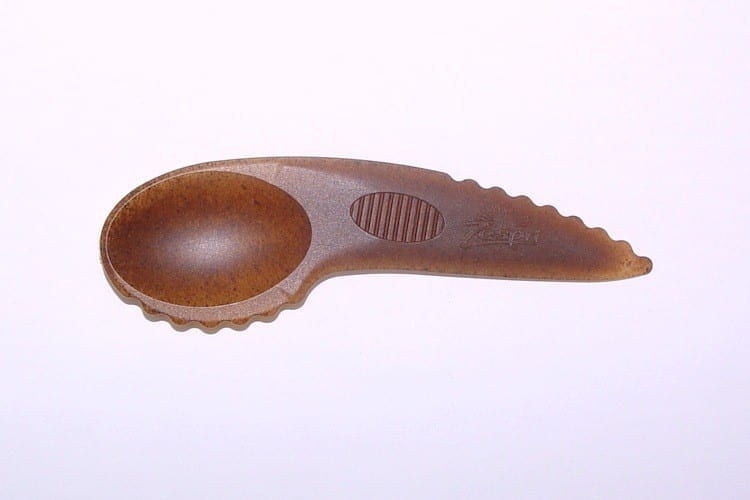Zespri International Limited is the world’s largest marketer of kiwifruit. It is owned by Aotearoa New Zealand kiwifruit growers and sells premium kiwifruit into more than 50 countries, managing around 30% of the global volume. Kiwifruit makes up just a fraction of globally-traded fruit so making it easy for consumers to cut, scoop and eat the fruit is a key part of growing demand for kiwifruit around the world. To help achieve this, Zespri released a spife, a spoon-knife utensil, made out of polystyrene (#6) plastic, in the 1990s.
Around 2010, the debate about ‘food miles’ prompted Zespri to assess the carbon footprint of transporting kiwifruit to the European market. At the same time, European customers, initially those purchasing organically-grown kiwifruit, were expressing concern about the plastic in the spife and the inability to dispose of it in a more environmentally-friendly manner.
Zespri recognised that changing consumer expectations, along with rising concern about climate change and non-renewable resource use, were likely to lead to increased regulations in the global market. Analysis showed the plastic spife contributed to ~3% of Zespri’s total carbon footprint.

The biospife developed by Zepsri.
In addition, the industry produced waste biomass (low-grade fruit) each season. There was clearly an opportunity to improve the sustainability of the business and build added brand value.
Zespri partnered with Scion along with Alto Packaging Limited to develop and manufacture spifes made from bioplastics and residual kiwifruit waste. Its design was guided by industrial composting standards and it is considered one of the first successful initiatives showcasing product development aligned to the principles of the circular economy.
While there are ongoing challenges with the availability of industrially composting facilities, a reusable and industrially-compostable spife continues to meet with favourable consumer sentiment. As investment in more advanced waste infrastructure expands offshore, Zespri is well placed to capitalise on this.
Zespri has some insights for other exporters on successfully navigating future regulatory trends to guide business decisions and innovate to meet these needs. These include:
- Invest in understanding future trends
- Measure the environmental impacts of your business and your products
- Understand consumer sentiment in your markets
- Develop long-term partnerships to support innovation
- Collaborate with scientists, technical experts and companies in the value chain
- Be patient – it takes time to bring concepts to commercial reality
- Show leadership – while the solution may not be perfect, each step shifts a complex system towards the goal (in case this, a circular economy solution)
- Persevere with blockages in the value chain (read ‘What’s stopping the uptake of new materials?‘)
Further complexity is likely to come from the potential divergence of countries that import Aotearoa New Zealand products into two camps – those that have strict regulations on imported plastics and packaging and those that do not. Collaboration between companies to develop solutions to meet the needs of various jurisdictions may prove crucial for exporters to stay ahead of non-tariff barriers and meet consumer needs.
